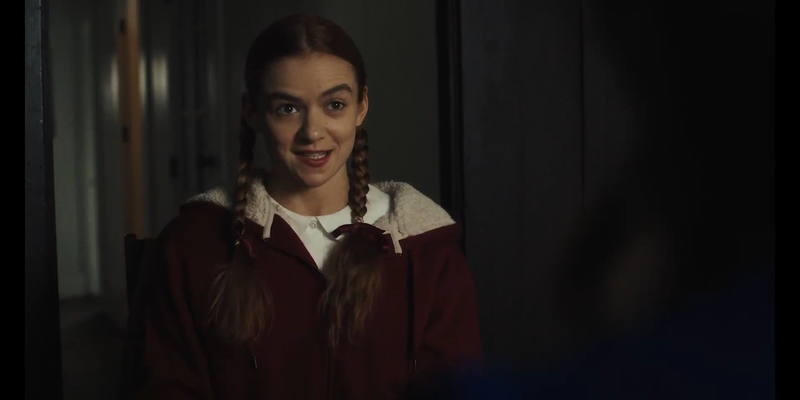
Review by
Eric Hillis
Directed by: Mercedes Bryce Morgan
Starring: Morgan Saylor, Kat Foster, Danilo Crovetti, Myko Olivier

Some movies spring their big twist in the final act. Others introduce it
early on, or halfway through. Director Mercedes Bryce Morgan holds
back the big reveal of Spoonful of Sugar so late that the
closing credits unspool over the moment. In recent decades, thrillers have
become more concerned with springing a late surprise on the audience than in
building a suspenseful scenario that will keep the viewer invested beyond
waiting around for a shock. Spoonful of Sugar is another
frustrating example. If that final image had been presented to us from the
start it would have made for a far more satisfying viewing experience. It
would have erased the many questions we find ourselves asking throughout
Spoonful of Sugar regarding why nobody is behaving in a
realistic manner. It would have created suspenseful moments of "don't turn
your back on that person" because we'd know exactly who has villainous
intentions towards whom. As it is, Spoonful of Sugar is such
an irritating watch that many viewers likely won't make it as far as the
final reveal.

As its Mary Poppins referencing title suggests,
Spoonful of Sugar concerns a nanny. Well, she's referred to as
a babysitter, but she's expected to perform the duties of nanny, babysitter
and housekeeper. I'm referring to Millicent (Morgan Saylor), the LSD
addicted whacko who applies for the role of looking after little Johnny (Danilo Crovetti), the mute and allergy riddled son of writer Rebecca (Kat Foster)
and her perenially shirtless and sweaty carpenter hubby Jacob (Myko Olivier).
It's during Rebecca's interview of Millicent that we first begin to
question the logic of what we're witnessing. Millicent gives off such a
nervous energy that no mother would want her around her kid, and she clearly
seems to be lying about certain details like her age (she claims to be 21,
but Rebecca remarks how much younger she looks). Rebecca also notices Millicent coming
close to an orgasm as she intently watches Jacob spraying himself down with
a hose outside as though he's auditioning for some upcoming Diet Coke man
reboot. Yet Rebecca goes and hires Millicent all the same.

What ensues will be familiar to anyone who has seen the dozens of thrillers
and TV movies about dodgy babysitters/nannies. We expect Millicent to seduce
Jacob, and she does. We expect her to come between Rebecca and her son, and
she does. We expect Rebecca to begin investigating the background of this
odd young woman she's hired, and she does. No wait, she doesn't. This is
where Spoonful of Sugar deviates from the norm. Not only does
Rebecca not behave like a real mother, she doesn't even behave like a mother
in an evil babysitter/nanny thriller.
The title also refers to the droplets of LSD which Millicent administers,
initially to herself and then later to Johnny. Admittedly this is an aspect
we're not accustomed to seeing in movies like this, but the film never does
anything particularly interesting with it, resorting to the usual visual
clichés unimaginative movies use to convey such stoned states. The fact that
Millicent is clearly away with the fairies most of the time and yet Rebecca
never picks up on this is just another irritating aspect of the the movie,
one which would have been erased if that final reveal had been made clear
far earlier.

The only positive aspect of Spoonful of Sugar is Saylor's
performance. The young actress appears to understand the sort of movie she's
in far better than those behind the camera, and has fun going full Bette
Davis, all mascara tears and cracking face paint by the end. What's
frustrating is that the movie could have easily been rejigged to give her a
vehicle worthy of her performance. Morgan and screenwriter
Leah Saint Marie no doubt thought it would be clever to deliver a
twist on the evil babysitter formula, and it is quite clever, but clever
doesn't always equate to entertaining. Spoonful of Sugar is a
case where sticking to the formula may have been advised, rather than
experimenting with alternative practices.


